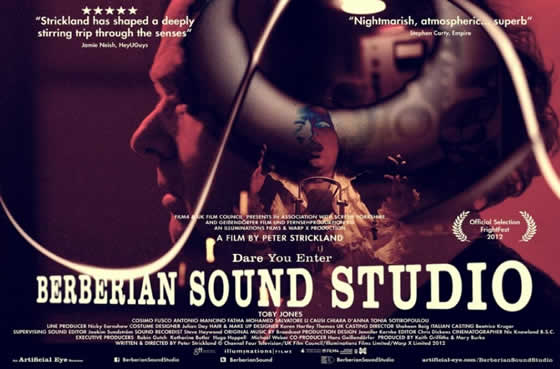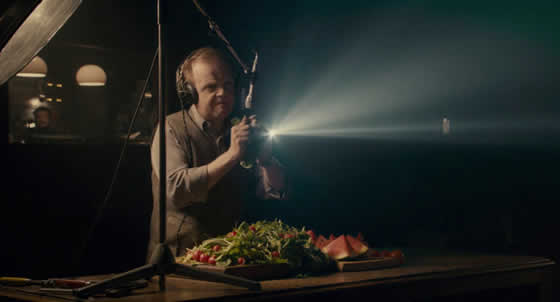 Berberian Sound Studio by British writer/director Peter Strickland, is an eerie, atmospheric homage to the Italian giallo films of the 1970s. Giallo films, or “spaghetti thrillers” are a unique blend of experimental art and sleazy exploitation, featuring soundtracks from some of Italy’s most sophisticated, boundary pushing composers. Strickland is a soundtrack buff and experimental musician himself, and with Berberian, he initiates us into this weird little world of audiophilia that might otherwise have gone uncelebrated.
Berberian Sound Studio by British writer/director Peter Strickland, is an eerie, atmospheric homage to the Italian giallo films of the 1970s. Giallo films, or “spaghetti thrillers” are a unique blend of experimental art and sleazy exploitation, featuring soundtracks from some of Italy’s most sophisticated, boundary pushing composers. Strickland is a soundtrack buff and experimental musician himself, and with Berberian, he initiates us into this weird little world of audiophilia that might otherwise have gone uncelebrated.
Toby Jones plays Gilderoy, a timid, introverted sound engineer, who arrives from England to record and mix the audio for ‘The Equestrian Vortex’—a supernatural, torture-laden thriller about witchcraft and its violent repression by the Catholic Church. Gilderoy, who is accustomed to working on nature documentaries, is shocked when he learns what he’s gotten himself into.
As we watch Gilderoy do his thing, we are privy to old-school techniques of sound design. We see the power of cinematic audio, especially in terms of horror. But as he records the sounds of vegetables being ripped, hacked, and smashed as sound effects for the on-screen violence, we see the absurdity of it. This absurdity is compounded by scenes of voiceover actors in sound booths, their faces contorted into grotesque configurations as they howl, whisper, and cackle into microphones. It is as disturbing as it is hilarious. And while Strickland, in some ways, deconstructs and demystifies movie-making, Berberian itself is loaded with the same kinds of techniques, which are quite effective..
 Berberian has little in the way of action and no gore whatsoever, but its haunting atmosphere seeps in as the film progresses. Strickland uses themes of work, exploitation, the psychological effects of violence, masculinism, and cultural disorientation to create the mundane but nightmarish world Gilderoy finds himself in. Eventually, the on-screen violence of ‘The Equestrian Vortex’ (which we never see), and the off-screen exploitation, especially the overwhelming machismo of his employers, begin to take a toll on Gilderoy. Things get increasingly weird, to the point of total absurdity, leaving the viewer to try to reverse engineer the ‘story’ which is more impressionistic than conventionally narrative.
Berberian has little in the way of action and no gore whatsoever, but its haunting atmosphere seeps in as the film progresses. Strickland uses themes of work, exploitation, the psychological effects of violence, masculinism, and cultural disorientation to create the mundane but nightmarish world Gilderoy finds himself in. Eventually, the on-screen violence of ‘The Equestrian Vortex’ (which we never see), and the off-screen exploitation, especially the overwhelming machismo of his employers, begin to take a toll on Gilderoy. Things get increasingly weird, to the point of total absurdity, leaving the viewer to try to reverse engineer the ‘story’ which is more impressionistic than conventionally narrative.
Though Berberian is minimal in terms of plot, it is positively robust as an audio-visual experience. Shot in 35mm film, we get one beautifully composed, richly colored scene after another, set in a mid-century European vintage. This sets the sumptuous tone for a clearly fetishistic preoccupation with analog audio gear, as the camera lingers voyeuristically over reels, faders, and meters. James Cargill of Broadcast provides an uncannily retro soundtrack with all the wispy, ethereal electro-acoustic voicing that made giallo soundtracks such works of art.
Strickland uses Berberien as a vehicle for various artistic lineages that hold his fascination—things that might have otherwise gone unnoticed by most. But he’s not merely indulging in empty aesthetics. He works subtle layers of meaning into his cinematic tone poem from the stuff of life—stuff that’s so ordinary, we hardly notice how disturbing it is.
Berberian Sound Studio opens at the IFC Center in New York, and in Los Angeles at the Arena Cinema in Hollywood, Downtown Independent in Downtown LA and will be available on VOD.
